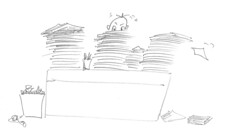Someone told me of an X exchange that took place a few weeks ago in which teachers were saying that their kids found Scratch boring. Well (he says, arms akimbo), here are my views on that.
First, it is axiomatic that kids either find lots of things “boring” or say they do. It’s a knee-jerk reaction to everything that is put to them. (That, and “We did this last year”). So maybe those “boring” comments should be taken with a huge sack of salt.

Bet you can't do THIS in Scratch!
Second, if they really are finding it boring, then that is like saying a pen is boring. Scratch is, in effect, a tool by which to achieve something, such as an understanding of aspects of programming, not an end in itself. It sounds to me like there is something wrong with the scheme of work, the activities they are being given or the way it is being taught. When I was teaching programming using BASIC, Visual Basic and Visual Basic for Applications, my students didn’t say they were bored. They didn’t even look bored. Of course, it could be that they found the programming boring, but that my charismatic personality combined with my brilliant teaching counterbalanced their ennui. We shall never know.
For examples of utterly non-boring Scratch projects, meander over to the Literacy from Scratch website. I especially like the Solar System, which is pretty amazing.
Tomorrow, I hope to work on the next issue of Digital Education. It contains guest articles, including a nice one by student Ellie Gregson and one by lecturer, PhD student and STEM Ambassador Amanda Wilson.

Your newsletter editor is hard at work sifting through the submissions for Digital Education, the free newsletter for education professionals. Have you subscribed yet?
Read more about it, and subscribe, on the Newsletter page of the ICT in Education website.
We use a double opt-in system, and you won’t get spammed.

